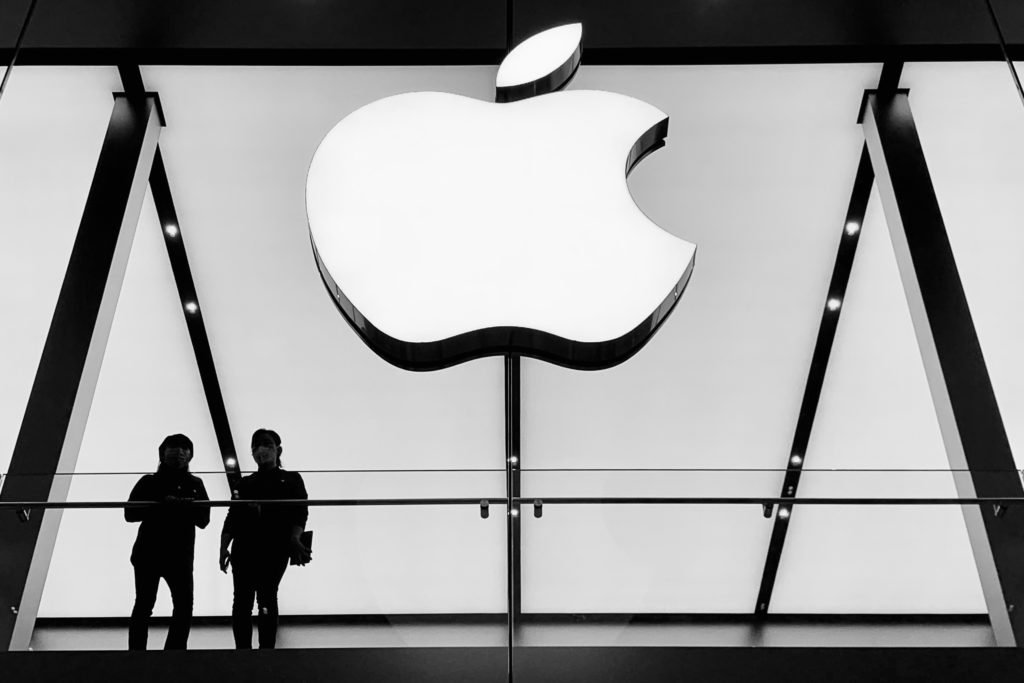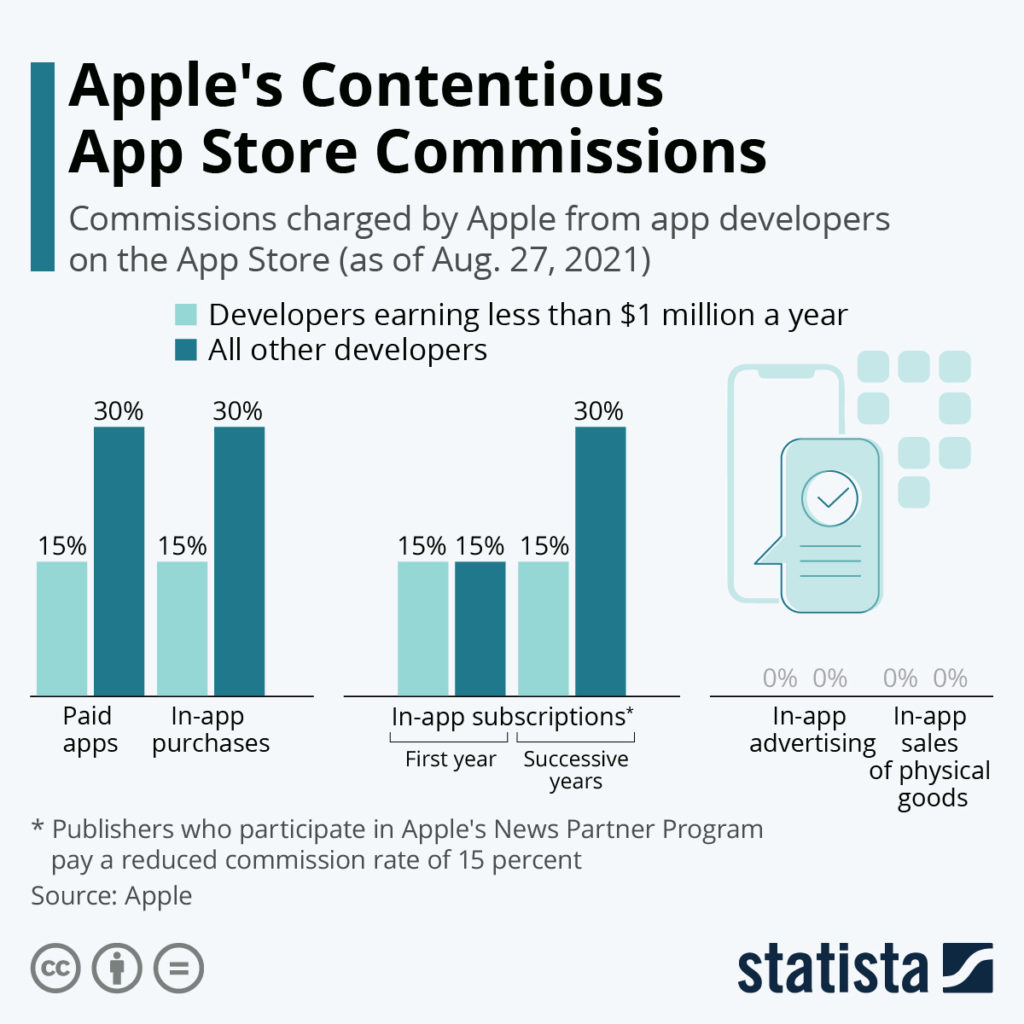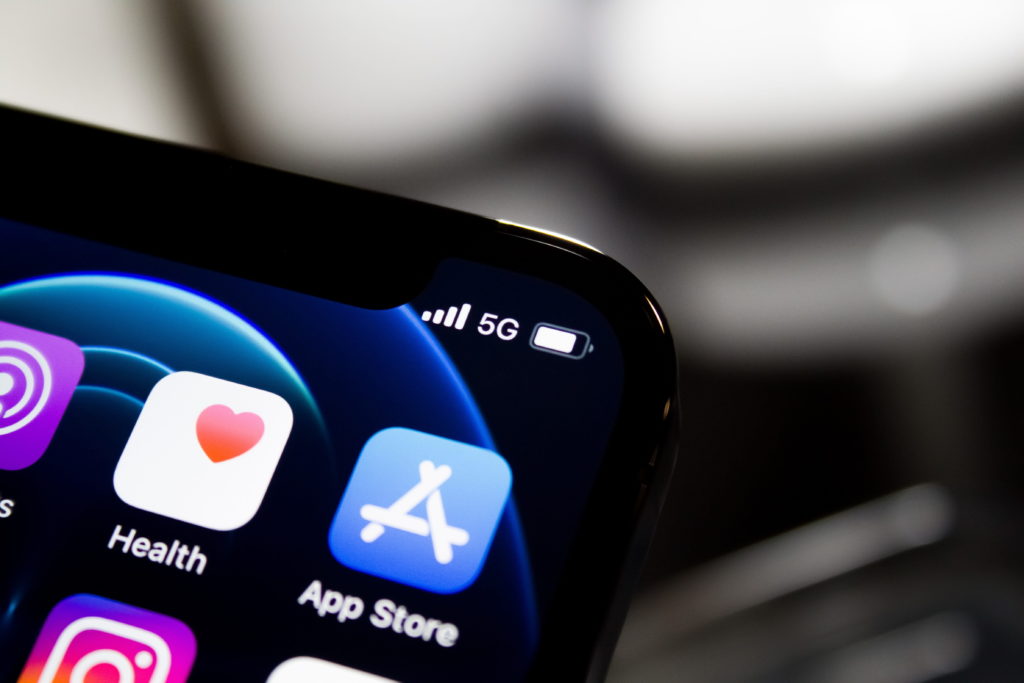What’s happening with the App Store in-app payment fees
App Store Optimization (ASO)
September 13, 2021
Apple’s recent announcement concerning its fees over in-app transactions made big news. Indeed, the 30% fee collected by Apple on every in-app purchase is something every developer is well aware of (and most of them are pushing against it).
The Cupertino firm is announcing changes to this policy, amongst other smaller shifts. Amid several antitrust lawsuits, the app store model is facing an inevitable transformation.
The big announcement
On August 26th, Apple announced via press release that it had reached a settlement in a class-action lawsuit filed against them by developers in the US. The lawsuit was filed in 2019 by app developers Donald Cameron and Illinois Pure Sweat Basketball. They are accusing the firm of engaging in anti-competitive practices by allowing only to download iOS apps through its App Store.
The agreement is still pending court approval. The biggest change is an official clarification stating that developers can share information on how to pay for purchases outside of their iOS app or the App Store (purchases that won’t be subject to Apple commissions if they take place outside of the App Store). However, users will have to explicitly agree to receiving outside messaging from apps and be able to opt out at any given moment.
Other changes include :
- The creation of a $100 million fund for small developers (for apps earning less than $1 million annually), granting them between $250 and $30,000
- The Small Business Program (where developers earning less than $1 million annually pay a 15% fee instead of 30%) will continue for at least 3 more years
- An increase in the number of possible prices for an app (up to more than 500 price points)
- An annual transparency report showcasing statistics about the app reviewing process, including the number of apps rejected for different reasons, app removal, number of customer and developer accounts deactivated, etc.
- Apple also agreed to keep its app search results “based on objective characteristics like downloads, star ratings, text relevance, and user behavior signals” for at least 3 years
- They will publish additional information about the app appeals process to the App Review website to “help developers understand how the appeals process works”

Is it enough?
Spotify is a big advocate against Apple’s antitrust policies in its App Store. They have an entire website dedicated to their fight against Apple’s unfair guidelines and asked the European Commission to get involved. Just after the settlement was announced, the music app tweeted their disappointment with the changes.
Many seem to think that the change, while still potentially important, isn’t as significant as advertised. In the latest update to the App Store Guidelines, in June, developers were allowed to communicate with customers outside of their apps but they weren’t allowed to contact them about alternate payment options using information obtained inside the app.
The settlement would lift this rule for all app categories, allowing developers to avoid the 30% commission with this particular option but still not enabling them to contact their customers about payment options inside their app. As a matter of fact, they can’t even provide a link within the app to an alternative payment platform, let alone mention it.
The Coalition for App Fairness called the agreement a “sham settlement” that is “nothing more than a desperate attempt to avoid the judgment of courts, regulators, and legislators worldwide”. It’s just an empty gesture from the Cupertino firm, underlining Apple’s total control over the app marketplace. The nonprofit organization was formed to support a competitive and fair playing field for all app and game developers. Among its founders are Epic and Spotify, two companies that are currently involved in legal proceedings against Apple’s antitrust and anti-steering policies.
The consensus amongst developers seems to be that, with this announcement, Apple is just doing the bare minimum to avoid unwanted legal consequences.

Even if Apple is aiming to settle with a specific lawsuit, its anti-steering policy is still very present in the App Store, feeding into antitrust concerns. Especially when, in the midst of all of this, Apple is offering a 15% cut for news apps if they join Apple News. They’re leveraging their fee to promote their new tool.
However, even if the 30% fee is criticized globally, this agreement only concerns those with a US-based developer account. What about developers outside of the US? Will they have to wait for governmental regulations like the new South Korean law?
South Korea takes on the app store payment dominance
South Korea is the first country to come to an official decision concerning in-app payment commissions (for both Google and Apple). The country’s National Assembly voted on August 31st what was dubbed as the “Anti-Google law”. The law will prevent Google and Apple from forcing app developers to use their in-app billing systems (on which they collect a 15% to 30% commission).
The South Korean preliminary committee voted on August 25th to proceed with the revised Telecommunication Business Act, which will restrict Apple and Google from charging app developers commission on in-app purchases.
Apple released a statement saying that this new bill will put users at risk of fraud and undermine their privacy. Google didn’t comment.
Japan is joining the fight
South Korea isn’t the only country to try and move things along. The Japan Fair Trade Commission (JFTC) closed its app store investigation with an agreement with Apple. It had been looking into Apple’s anti-competitive practices since 2019. As part of their settlement with the JFTC, Apple will allow some developers to “include an in-app link to their website for users to set up or manage an account”.
However, this change will only affect “reading apps”. There’s no precise definition of what exactly a “reading app” is but according to Apple, it would include big names like Spotify and Netflix, and apps offering content subscriptions for newspapers, books, audio, music, digital magazines, and video.
Even though this settlement took place in Japan, Apple promised these changes would be applied globally.

Apple vs international lawsuits: what does it mean for the App Store?
Even though South Korea and Japan are the first to implement concrete actions against Apple’s monopoly on in-app purchases, they’re not the only ones looking into it. Apple is currently battling several lawsuits in different countries. Spotify is suing them in the European Union and Epic is doing it in the US. The Australian Competition and Consumer Commission (ACCC) is also considering implementing regulations for the digital payment systems of Apple, Google, and WeChat. And the Competition Commission of India is suing them, claiming their in-app payment commission is an abuse of power because of the duopoly in app markets.
It’s not only lawsuits, just like South Korea several governments are also looking into bills to regulate app stores. A bipartisan bill was introduced earlier in August in the US Senate to force Google and Apple (and other app stores with more than 50 million users) to let apps communicate with users about prices, protect sideloading and allow third-party app stores. The European Union is also working on the Digital Market Act, to ensure a fair and open digital market, including app stores.
Both Google and Apple have been under scrutiny over the years for the restrictive rules in their app stores. South Korea’s new law may become a tipping point, pushing more international authorities to implement stronger antitrust and anti-steering laws.
Apple always used privacy and security as its biggest counter-argument but it may not be enough anymore. While we’re waiting for the decisions of the European Union Commission on the Spotify case and we just got the results of the Epic trial, Apple may need to create adjustments and offer more leg room for developers.
Indeed, the Epic trial judge issued a permanent injunction restraining Apple from “prohibiting developers from (i) including in their apps and their metadata buttons, external links, or other calls to action that direct customers to purchasing mechanisms, in addition to In-App Purchasing and (ii) communicating with customers through points of contact obtained voluntarily from customers through account registration within the app”. The injunction should take effect on December 9th, forcing Apple to finally allow US developers to communicate in-app with their users about alternative external payment options.
What about Google’s Play Store?
Apple’s settlements with the US class-action lawsuit and the Japan Fair Trade Commission only concern them, but the possible implementation of new laws like the one in South Korea would also affect Google. Besides, Google is also involved in its fair share of antitrust lawsuits.
Needless to say, any new law on the subject would affect both stores equally. The growing international interest in regulating antitrust and anti-steering behaviors on app stores is likely to stir some big changes in the app world in the coming years.
What do you think about Apple’s announcements, should they have done more? Tell us in the comments!
- Mobile Video Monthly #38 – November 2023 - 5 December 2023
- Disturbing ads, a new trend for mobile gaming creatives? - 28 November 2023
- The Power of Holiday Marketing in Boosting Mobile Game Engagement - 21 November 2023

